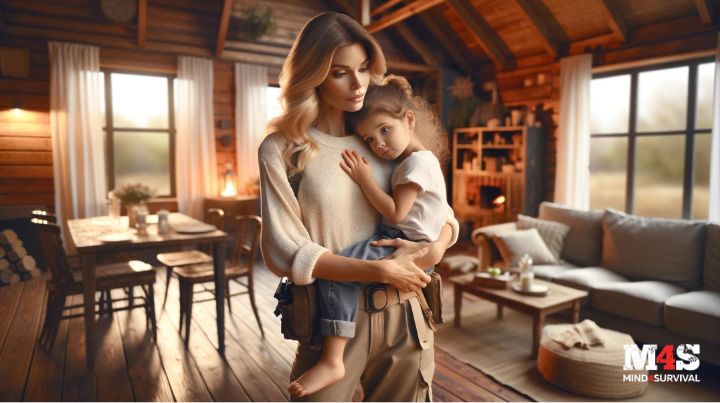Teach Children How to Face a Disaster Without Scaring Them

Do you know how to teach children how to face a disaster without scaring them? Just like their parents, children are often scared of the unknown or unfamiliar. Because of their fear, it’s essential that you take the time to explain the dangers that they may encounter.
If you do, your children will become more familiar with their vulnerabilities. This increased familiarity will help them to be less afraid. As they grow less fearful, they will also become safer, more secure, and better prepared.
Avoid Scare Words and Tactics
When discussing how to face a disaster with your children, it is best to avoid scare words and tactics. Scare words and tactics may cause anxiety and fear, which take away from the learning experience. For example, avoid telling your child, “You’ll die if…”
Also, since child abduction is often a concern, try to avoid phrases such as “The man will get you…” Instead, try to think about the intent of what you are saying. If it’s to make a scary point to convince your child not to do something, it may be better left unsaid. Remember, the goal is to prepare children for something bad without scaring them.
If you are teaching a child how to face a disaster of a different type, like a storm, a power outage, or an earthquake, giving them plenty of information ahead of time will help them to understand what might happen. Knowing this in advance makes it less frightening because then they know what to expect.
Use Positive Reinforcement
Instead of using scare words and tactics, focus on using positive reinforcement. You can achieve positive reinforcement by using simple terms to explain what makes a particular situation unsafe. When describing why they shouldn’t speak to strangers, tell them it’s because mommy doesn’t know the person. Doing so can establish a real, practical, but non-scary reason in your child’s mind for not speaking with strangers.
Create a Plan of How to Face a Disaster
Once your child understands the lesson you are teaching, discuss what to do if he or she finds himself or herself in that situation.
For example, the National Crime Prevention Council suggests teaching children “No, Go, Yell, Tell” (NGYT). NGYT is a course of action for children to follow when a stranger approaches. If approached, they should say “No,” then “Go” (run away), “Yell” as loud as possible, and lastly, “Tell” an adult.
It can also be important to teach your kids to shout, “That’s not my Mom (or Dad),” so that bystanders don’t just think they’re throwing a temper tantrum and are more apt to help.
When planning for other types of emergencies, give them instructions such as, “Get under the table” for an earthquake or “Go down to the basement” for a tornado. Children are empowered when they know what to do.
Act It All Out
After teaching your children what to do, role-playing the situation with them reinforces everything. By acting out the lesson, you are strengthening it, but you are also doing it in a fun and not scary way.
So, play the part of the stranger and have your child act out the NGYT process. Have him or her act it out with another adult playing the same role, so it adds to the overall fun. Make it more fun by having everyone overemphasize their actions. Doing so will help your child retain the information and prepare for when a stranger approaches.
You Set the Example of How to Face a Disaster
An important point to remember is that you are the model for your child. Therefore, if you regularly speak with strangers, your kids will pick up on this and may think it is okay. However, if you do have to talk with a stranger, you should explain why it is okay in that particular situation.
Maybe it is okay because the stranger is also a mommy in the shopping mall with her children. Perhaps it’s okay because you and your child were together rather than alone when the conversation occurred. Maybe the stranger is a uniformed police officer or firefighter, who you may teach are good people.
Other simple habits like always fastening your seatbelt in the car, always locking the door to the house, etc., can reinforce good habits in your children.
You can also provide an example of handling a crisis calmly and efficiently. Doing this will show your children a better way to face a disaster than panicking.
Impress Your Family’s Safety and Security Values
Lastly, it is essential to impress your family’s safety and security values and rules upon your child. As you do, make the most of non-scary, teachable moments to reinforce your lessons and help them learn to face a disaster.
Take advantage of everyday opportunities to explain and teach things to your children. Doing so will help your child’s sense of security, safety, and preparedness evolve as he or she grows. It will also provide them with the foundation they need to pass on your safety rules to their children when they’re older.
The Bottom Line on Teaching Your Children How to Face a Disaster
In the end, learning how to prepare children to face a disaster without scaring them isn’t hard. It just takes thought, time, and dedication. Think about ways to prevent your lesson from being scary. Once you’ve thought it through, take the time to explain the issue.
Then, reinforce your experience by acting out the scene with your child in a fun way. Lastly, stay dedicated to finding new ways to enhance lessons that will lead to a safe, secure, and prepared life. When you do, you will help prepare children for something bad without scaring them.
Additional Resources
- Emergency Preparedness for Families
- Event Safety for Families with Children
- Teaching Situational Awareness to Kids
- Live Science: Talking About Child Safety
Stay safe,
Don't Miss Out!
Join the thousands of people who rely on Mind4Survival preparedness advice by subscribing to our FREE newsletter.
- Practical preparedness information
- Zero Spam
- < 0.25% of people unsubscribe




Join Mind4Survival!
Stay informed by joining the Mind4Survival! 100% Secure! 0% Spam!
Follow Us!
Affiliate Disclosure
Mind4Survival is a free, reader-supported information resource. If you make a purchase through our link, we may, at no cost to you, receive an affiliate commission.



Brian,
Thanks for the great podcast. I’ve been listening to it for about two months now, and I’ve almost caught up on all the episodes. I appreciate your calm, serious, balanced take on preparedness. I don’t ever feel like I need to make a tin foil hat when I’m listening. 🙂 I’ve even bought a book or two and listened to guests you have on, and they are good, but in their material some times it is too tin foil hat for me, but you always do a great job of bringing balance and realism to your show. I don’t mean to insult them, and I’m grateful for their perspective. Thanks for all you do. Thanks for all your hard work now in the show and for the country and your serve in the military/ambulance.
Thanks, David. I appreciate your feedback!
shouting help from a child can come when a parent tries to get a child to do what they don’t want to do. like getting into a car from a trip to the park. I taught my kids to yell fire , fire, fire as loud as they can. it is the single word that will make people look around to see where it is coming from. anyone trying to abduct a kid won’t want the attention. they know that when enough people look they can be recognized I also taught them how to get away when held up off the ground. double up so your weight is forward forcing them to maintain balance. it will also cause their head to go forward. then they straighten their body quickly and hit their face with the back of their head. when done quickly the attacker usually softens their grip. with the heel of their shoe, they then target the kneecap. the pain caused should release their grip so they can start running. also continue to scream fire, fire. a damaged knee should slow them up enough to get away. the main thing is teaching kids not to panic but react to real danger. while running they must teach them where to run. run where there is the most people around. if there is no people getting as far away as possible as quickly as possible. if they need to go to a house for help again pounding upon the door and yelling fire. it will get more attention and you are less likely to get shot. standing off to one side is a good idea. when someone answers their first words are to CALL THE POLICE. it lets them know you are not there to harm them and you need help also teach them to choose a house with lights on downstairs. while no methods are sure these will provide a better chance of escape. when they have more than one person kick for the face and groin. also, teach kids to use things they have as weapons. a pencil or pen. having a pen that isn’t retractable is better. the choice of targets is important. if their arms are held down and they have a few moments before anyone grabs them teach them to get the pen into their hand with the point down. then as you stab them try a point that causes the most pain. the hands have the most pain receptors then as they release their hold go for the eyes. and they will try to get away from the point. this is when they kick them in their knees. you can get away better when they can’t run. again screaming fire. Also, this works best when the child doesn’t need to think about it. the faster they move the better their chances. practice with your child. resistance and becoming noticed diverts their attention. it can also get your child help. Also teach them what to do for a friend, brother or sister that is being abducted. because it is far too long to address I will leave it up to you to compile their actions. thanks for reading my post. ——– I, Grampa